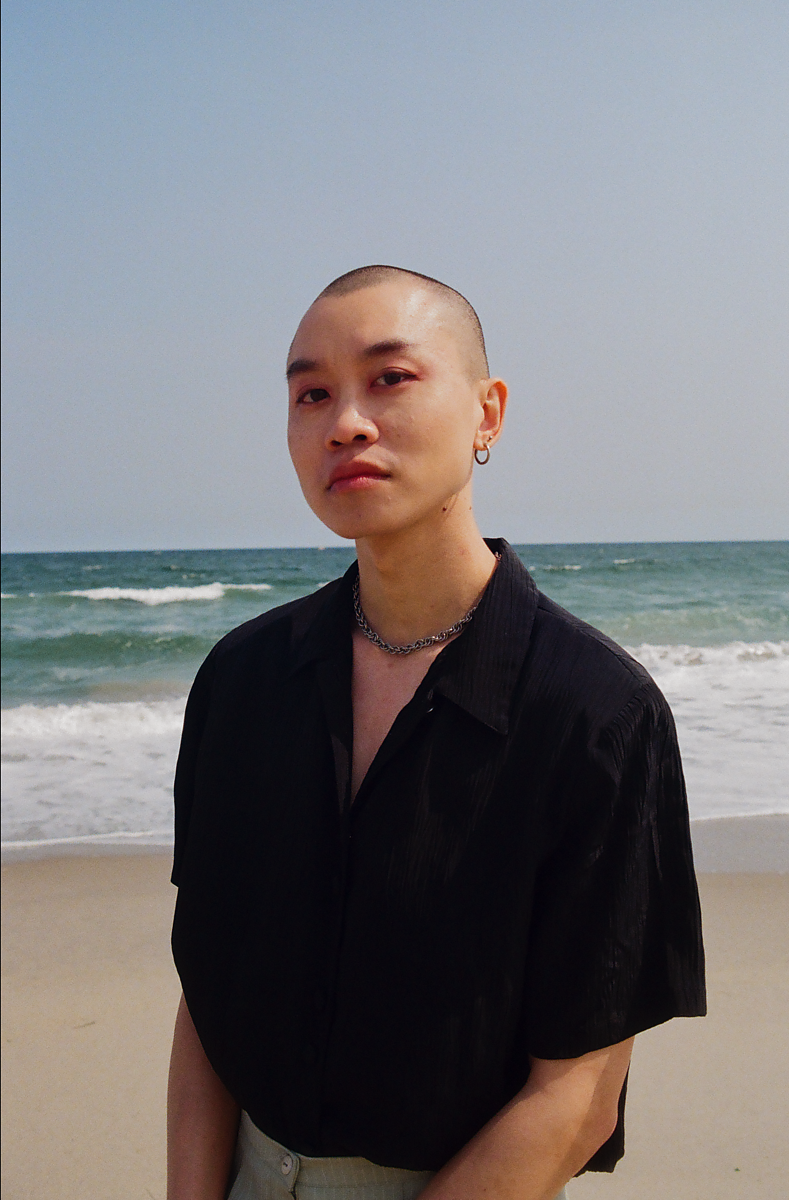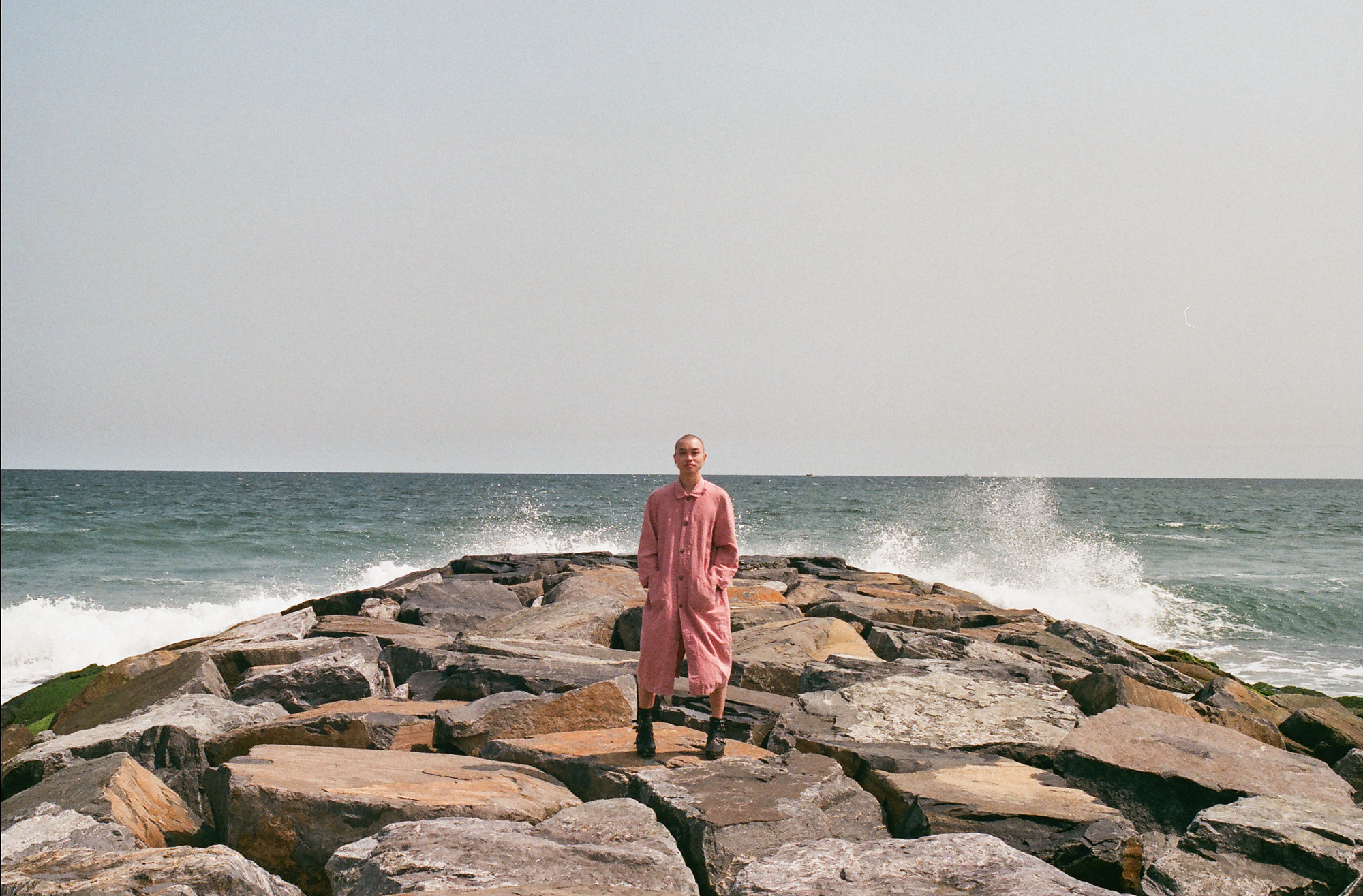Robert Ouyang Rusli Captures the Absurdities of Being an Immigrant Through Music
Composer Robert Ouyang Rusli knew that they had to pull out all the stops for the film Problemista. “I had never scored comedy. I just hadn’t been that interested,” Rusli told me from their temporary home in Iowa, where they’ve been living for the past few years after a decade in New York City. Yet after reading the screenplay for the A24 film, the film composer and artist was taken by how writer/director Julio Torres told the story of an aspiring El Salvadoran toy maker navigating both the New York art world and obtaining a visa in a completely unpredictable, fantastical, and gut-wrenchingly funny way.
“But this film is not really a comedy,” clarified Rusli. “It’s a Julio Torres comedy. It’s so specific and expansive. The film is like an adult fairytale.”
The film’s maximalist vision of surrealist egg paintings, cryogenics, and Craigslist demons brought out Rusli’s most sprawling, out-of-the-box musical ideas. “I went nuts on the pitch,” they explained. “But Julio is the kind of person that thrives off enthusiasm and creativity. If he feels that you have a certain vision and understands it, he’ll let you roll with it.” With Torres’s vote of confidence, Rusli went on to meticulously build the 53-track soundtrack that has been praised for emerging as its own manic character in the film. Though Rusli has scored films since 2010, and released four full-length projects under their OHYUNG moniker, the Problemista score is their most ambitious work yet, revealing their inexhaustible imagination for worldbuilding.
Rusli conceptualized the score to function like a Greek chorus but that sounds more like “a combination of children’s choir and Bulgarian folk choir” They also created “a new language” for the film by brainstorming words that described the hopes, dreams, and fears of each character. Then, the chorus recorded each of those words in broken up syllables that later got jumbled up and reassembled. Pulling from minimalist composers like Steve Reich and John Adams, Rusli crafted other sections that “represent Tilda Swinton rushing around New York as a frenetic art critic.” There’s also futuristic synthesizers, didgeridoo rumbling, and magical sound effects to match Torres’s surrealist storytelling.
“I don’t know what other director would be ok with this,” Rusli said of some of their silliest choices, which include using a mouth sound—blehblehbleh—to accompany every mention of the archival software FileMaker Pro in the film (one of Problemista’s many nonsensical villains). “I would send those things to Julio, and he would just say, ‘This is hilarious.’ I really felt enabled to be my most ambitious, weirdest self.”
Rusli also connected to the way Problemista conveys the US immigration system with a dark absurdist humor. “I feel like I know every character in the film,” they said. “I have a lot of friends who are having their own visa or green card experience, struggling with bureaucratic negligence of their own.”
Born and raised in central Pennsylvania, Rusli said they had “a very [American Born Chinese] in a white town upbringing.” “My parents both speak English, too, so I feel like I was sheltered from a lot of immigrant experiences.” After a childhood of listening to Top 40 pop and playing violin in orchestra, they fell in love with rap—Wu-Tang, Jay-Z, Method Man—and started recording their own beats and songs in high school.
It was only after moving to NYC in 2010 that Rusli’s perspective began to expand, both politically and artistically. “When I first moved to New York, I did some work getting non-English speakers registered to vote,” they said. “I spent a lot of time in Flushing and Jackson Heights; I lived in Woodside for a year. That really shifted my perspective on Asian American identity.”
Though Rusli embarked on a number of music projects in those early years in the city—a rap project and a band, while steadily scoring films on the side—things didn’t click until they began performing as OHYUNG in 2016. “[Its birth] coincided with a big relationship change in my life and me feeling like my own person for the first time in a long time,” they explained. “I started taking pressure off myself to have expectations for my music career. I was just trying to have fun with it and produce music that surprised me. The lack of pressure really opened me up creatively.” In 2017, Rusli was awarded A4’s Van Lier Fellowship in music composition. It brought them a one-time mentorship session with the late composer Ryuichi Sakamoto. “He was like, ‘Your synths sound cheap,’ and I was like, ‘Yeah, that’s because they are,’” Rusli recalls.
Since then, OHYUNG has become an outlet for Rusli to “bare the soul” through compositions that are both punishing and cathartic. There is no throughline to the project other than trying “to do something a little different” every time. After releasing their 2018 debut album Untitled (Chinese Man With Flame), which they described as a project that channels “race rage,” they’ve made everything from aggressive noise—2021’s GODLESS—to textured ambient music—2022’s imagine naked. “Sometimes I think when I’m much older, if I were to look back at all my music and hit play on all the songs at once, it would sound crazy,” they said. “I want the retrospective of my music to be completely varied. That’s a sign of growth to me, as I try to take risks and learn and grow.”
Now, Rusli is plotting their move back to NYC, as well as a new solo album that they describe as “dark pop” and will prominently feature them singing throughout. They’re also looking forward to playing more OHYUNG shows, which usually sees Rusli throwing themself into the audience, screaming and thrashing around in campy costumes.
“A lot of people tell me they cry at my shows,” Rusli said. “The ultimate goal is [leading them through] some kind of release through noise and harshness, but finding the beauty in that, and then dropping them emotionally off the cliff. It’s like scoring my own film, in a way.”
—Michelle Hyun Kim is an award winning writer, editor, and curator based in Brooklyn, New York. Their work has been published by New York Magazine, W Magazine, Teen Vogue, Rolling Stone, NPR Music, Pitchfork, and other outlets.

